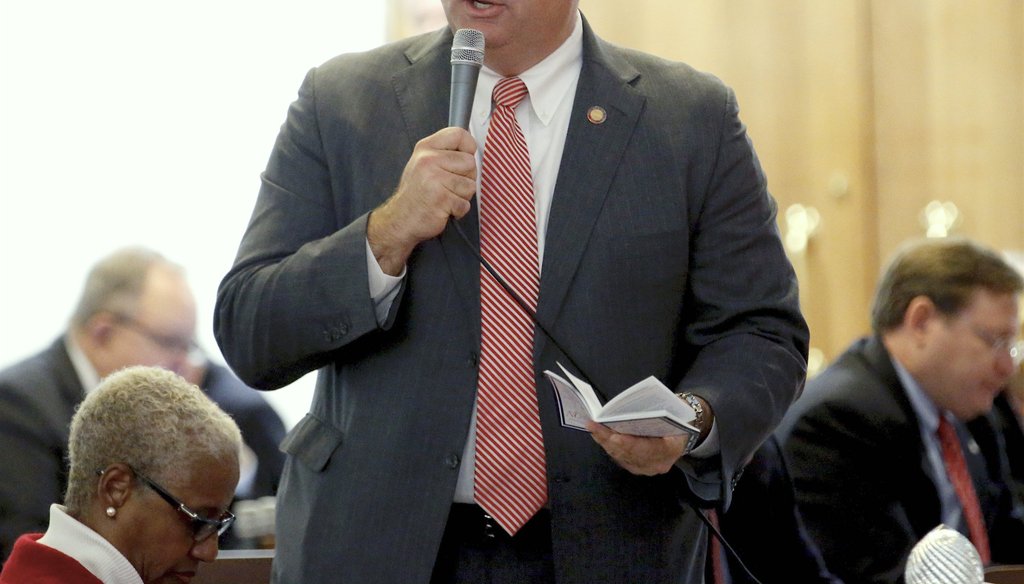

Our only agenda is to publish the truth so you can be an informed participant in democracy.
We need your help.


State Rep. David Lewis overstated the number of times Gov. Roy Cooper has sued N.C. General Assembly leaders.
When it comes to teacher pay, Republicans and Democrats say the other side isn’t doing enough.
And, with elections less than a year away, Republicans are slamming Gov. Roy Cooper for using his veto power.
NC Rep. David Lewis, a Republican from Harnett County, recently tweeted about Cooper’s history of vetoing proposals passed by the legislature.
"Gov. Cooper just vetoed another pay raise that the #NCGA passed, as he has every single teacher pay raise we've ever passed," Lewis tweeted.
Lewis went on to say that he’s "tired of Cooper using teachers as political pawns, blocking their raises then trying to convince them he cares."
Is it true that Cooper has vetoed every proposed teacher raise the legislature has passed since January 2017, when he took office?
Contacted by PolitiFact, Lewis spokesman David Capen said in an email that Cooper has vetoed four opportunities to raise teacher pay.
Lewis is suggesting that Cooper is opposed to raises in teacher pay. But, when you look at the reason Cooper vetoed the proposals, you’ll see Cooper hoped to secure better raises for teachers. Cooper vetoed:
Seeking higher raises
Cooper vetoed the GOP proposals in hopes of negotiating even higher raises. But the governor and Republican legislative leaders have yet to strike a deal.
"Every budget Governor Cooper proposed has contained significantly higher teacher pay raises than the Republican budgets, which deserved vetoes because they shortchanged teachers and prioritized corporate tax cuts," Cooper spokeswoman Megan Thorpe said in an email.
For example, she said Cooper’s budget sought to pay first-year teachers $37,500. That’s $2,500 more than the legislative budget proposal, according to the governor’s office.
The gap was wider for experienced teachers, Thorpe said. For teachers with 30 years of experience, Cooper proposed $58,000 and the legislature proposed $53,100.
Political drama aside, some teachers will get more money in their checks this year.
Cooper signed the Teacher Step Act earlier this month, authorizing raises for teachers who had previously qualified for them (by adding another year of work experience.)
But Lewis and others don’t consider that signature to be progress in the debate over long-term teacher pay.
Step raises
The Teacher Step Act authorized raises that had been previously-approved. In other words, the legislation didn’t enact a new raise structure -- which is at the heart of the teacher pay debate. But it did have a real-world effect of funnelling more money into teachers’ pockets.
"Step increases are not considered ‘raises’ in the traditional sense, as teachers (and other educators paid on the step schedule) earn them based on years of service," Mark Jewell, president of the N.C. Association of Educators, told PolitiFact in an email.
Jewell told the News & Observer in October that lawmakers shouldn’t get any credit for funding step increases that are required under state law.
"It’s state law that teachers get their steps based on the step schedule, so in this case all the step bill did was fully fund what was already guaranteed," he told PolitiFact.
Still, even though the raises had been previously negotiated, Cooper’s signature was key. Under the State Budget Act, no step increases are actually funded without legislative approval. (see page 22).
PolitiFact ruling
Lewis said Cooper has vetoed "every single teacher pay raise we’ve ever passed." While this is technically accurate, it suggests that Cooper opposes teacher pay raises -- which isn’t true.
In fact, Cooper vetoed the proposed raises in hopes of securing more money for educators. And his approval of step raises shows he’s not blocking teachers from the money they’re owed.
The statement is partially accurate but leaves out important details that might give the public a different impression of the situation. We rate this claim Half True.
Tweet by NC Rep. David Lewis, a Republican from Harnett County.
Email correspondence with David Capen, research assistant for Rep. David Lewis.
Email correspondence with Ford Porter and Megan Thorpe, spokespeople for Gov. Roy Cooper.
2019 NC Senate Bill 354, known as the Strengthening Educators’ Pay Act.
2019 NC House Bill 966, known as the 2019 Appropriations Act.
2018 NC Senate Bill 99, known as the 2018 Appropriations Act.
2017 NC Senate Bill 257, known as Appropriations Act of 2017.
Telephone interview with Leah Sutton, director of policy and advocacy for Best NC.
News & Observer story, "NC principals would get raises under budget plan, but teachers are still waiting," posted Oct. 23, 2019.
Email correspondence with Mark Jewell, president of the North Carolina Association of Educators.
In a world of wild talk and fake news, help us stand up for the facts.
